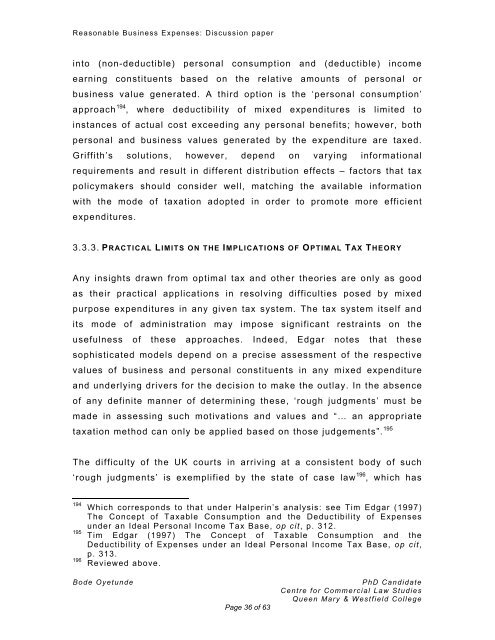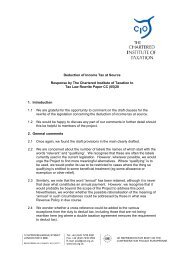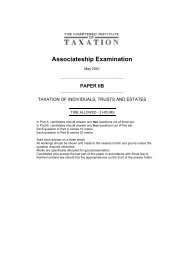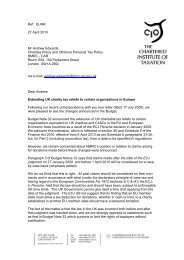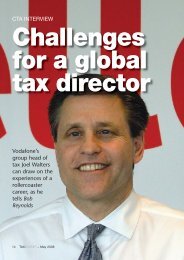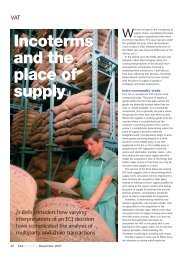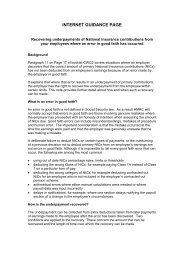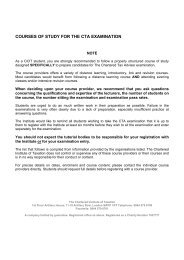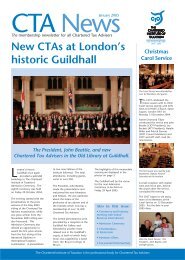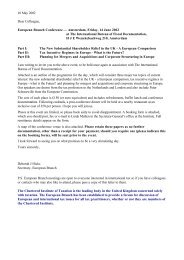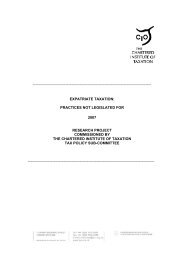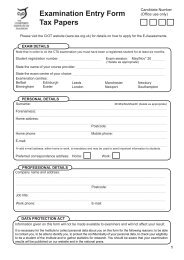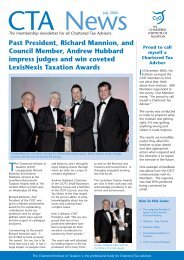Reasonable Business Expense - The Chartered Institute of Taxation
Reasonable Business Expense - The Chartered Institute of Taxation
Reasonable Business Expense - The Chartered Institute of Taxation
Create successful ePaper yourself
Turn your PDF publications into a flip-book with our unique Google optimized e-Paper software.
<strong>Reasonable</strong> <strong>Business</strong> <strong>Expense</strong>s: Discussion paperinto (non-deductible) personal consumption and (deductible) incomeearning constituents based on the relative amounts <strong>of</strong> personal orbusiness value generated. A third option is the ‘personal consumption’approach 194 , where deductibility <strong>of</strong> mixed expenditures is limited toinstances <strong>of</strong> actual cost exceeding any personal benefits; however, bothpersonal and business values generated by the expenditure are taxed.Griffith’s solutions, however, depend on varying informationalrequirements and result in different distribution effects – factors that taxpolicymakers should consider well, matching the available informationwith the mode <strong>of</strong> taxation adopted in order to promote more efficientexpenditures.3.3.3. PRACTICAL LIMITS ON THE IMPLICATIONS OF OPTIMAL TAX THEORYAny insights drawn from optimal tax and other theories are only as goodas their practical applications in resolving difficulties posed by mixedpurpose expenditures in any given tax system. <strong>The</strong> tax system itself andits mode <strong>of</strong> administration may impose significant restraints on theusefulness <strong>of</strong> these approaches. Indeed, Edgar notes that thesesophisticated models depend on a precise assessment <strong>of</strong> the respectivevalues <strong>of</strong> business and personal constituents in any mixed expenditureand underlying drivers for the decision to make the outlay. In the absence<strong>of</strong> any definite manner <strong>of</strong> determining these, ‘rough judgments’ must bemade in assessing such motivations and values and “… an appropriatetaxation method can only be applied based on those judgements”. 195<strong>The</strong> difficulty <strong>of</strong> the UK courts in arriving at a consistent body <strong>of</strong> such‘rough judgments’ is exemplified by the state <strong>of</strong> case law 196 , which has194195196Which corresponds to that under Halperin’s analysis: see Tim Edgar (1997)<strong>The</strong> Concept <strong>of</strong> Taxable Consumption and the Deductibility <strong>of</strong> <strong>Expense</strong>sunder an Ideal Personal Income Tax Base, op cit, p. 312.Tim Edgar (1997) <strong>The</strong> Concept <strong>of</strong> Taxable Consumption and theDeductibility <strong>of</strong> <strong>Expense</strong>s under an Ideal Personal Income Tax Base, op cit,p. 313.Reviewed above.Bode OyetundePage 36 <strong>of</strong> 63PhD CandidateCentre for Commercial Law StudiesQueen Mary & Westfield College


